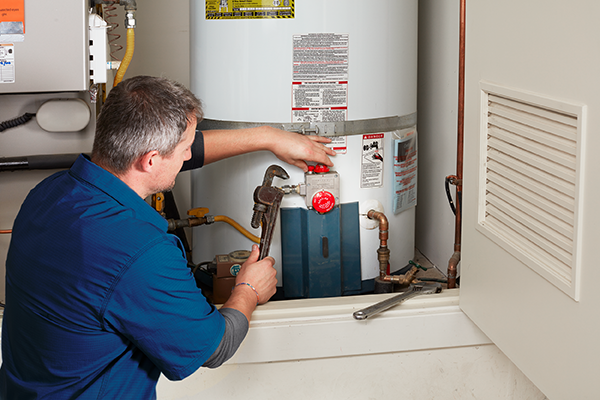The last thing you want to deal with this winter is a problem with your home’s water heater. Few things are more annoying than a cold shower on a chilly day. And in most cases, that unpleasant experience can be avoided with just a little bit of regular maintenance for your water heater. These processes will help you prolong your unit’s life expectancy and reduce the chances of a catastrophe like leaking hot water or no hot water at all.
Safety First
Both gas and electric water heaters have what is called a temperature-pressure release valve. This valve is designed to open and allow water to escape the tank if the tank’s pressure gets too high. In short, this is the safety feature that ensures that your hot water tank will never explode.
To test the valve’s function, lift the trip level on the valve, and release it. You should hear a slight hissing sound as air escapes or see just a small amount of hot water escape. But it should only last for a second or two. If the water continues to leak, the valve has failed and needs to be replaced. Turn off your water heater power and the water supply to the tank and call your trusted plumber to replace the valve. If the valve closes completely, you know that it functions correctly and is protecting you and your home.
Check The Anode Rod
The anode rod works to protect your water heater’s holding tank by capturing all of the corrosive material in your water. If the tank is more than 2 or 3 years old, the rod should be inspected annually. You can locate inspection instructions for your specific water heater online or call your trusted plumber to schedule an appointment for a water heater inspection.
When inspecting it yourself, you should expect to see some pitting and surface corrosion on the rod. However, if the rod is covered in calcium, is missing pieces, or is less than ½ an inch thick, it needs to be replaced. If it is not replaced, the added corrosive material in the water will drastically shorten the life of your holding tank and water heater.
Drain And Rinse The Tank
Even with the anode working correctly, there will still be some sediment that builds up inside the holding tank of your water heater. Not only does this build up threaten the integrity of the tank, but it also decreases the efficiency of your water heater. The minerals act as an insulator, which means you are wasting money on excessive power when heating water.
To drain and flush the tank, turn off the water supply and power. Next, attach a hose to the drain valve at the tank’s base and run the hose to a drain or the street. Open the valve to drain the hot water from the tank and then slowly turn the water supply line back on. The flow of water will wash all of the sediment from the inside of the holding tank. When the water coming from the hose is clear, the tank is clean. Close the drain valve on the holding tank, and be sure to turn the power back on. Also, check to ensure that the water supply line is completely open to refill the tank as quickly as possible.
Insulate For Winter
Insulating your water heater and exposed pipes is a great way to improve its energy efficiency. Purchase the blanket made for your model water heater to ensure that it fits correctly. Adding pipe insulation to exposed pipes will also help preserve your hot water temperature as it flows to your shower or faucets.
For assistance with these maintenance processes, call (318) 202-9144 to schedule an appointment with Gordon AC & Plumbing. Regular maintenance will provide a substantial return on investment and years of reliable hot water.



